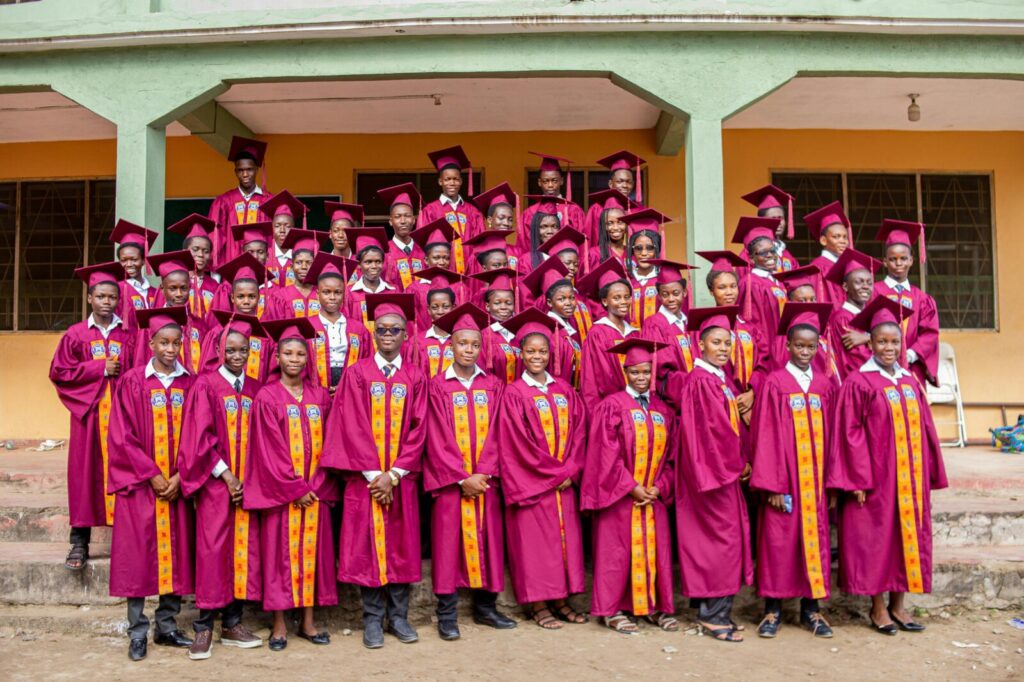Ghana is a country located on the west coast of Africa, and this year it has become one of our new destinations for experiencing volunteer work. Many of you have already booked your spot to participate in some of our projects, such as football coach, medical volunteer, child disability center assistant, or school teacher.
Today, we want to talk specifically about the last one, as we will explain how the education system in Ghana works.
Remember that on our blog, you can find interesting facts and useful information about all our destinations to help you prepare for your trip.

First of all, it is important to acknowledge that education in Ghana has experienced significant improvements in recent decades. However, many challenges still remain, which we will discuss later.
It is essential to understand that the education system follows a model based on the British system due to its colonial past and is structured as follows.
STRUCTURE OF THE EDUCATION SYSTEM
- PRESCHOOL/KINDERGARTEN: It lasts two years and is not mandatory, but it is becoming increasingly accessible.
- PRIMARY EDUCATION: It lasts six years (from ages 6 to 12), is compulsory, and free in public schools.
- SECONDARY EDUCATION: It lasts six years and is divided into two stages. Junior High School: Three years (from ages 12 to 15), compulsory. At the end, students take the Basic Education Certificate Examination (BECE), which determines if they can move on to Senior High School and Senior High School: Three years (from ages 15 to 18). Although encouraged, it is optional.
- HIGHER EDUCATION: This includes universities, technical institutes, and vocational training programs.
Free education has been gradually introduced over the years. In fact, it was in 2017 that fees for Senior High School (SHS) were eliminated, allowing many more young people to attend school.The main fields of study include: science, arts, business, agriculture, and technical subjects.
The official language is English, which is why classes are taught in this language, although in the early years of education, local languages are also taught.
Improved access to education has resulted in a higher literacy rate, now reaching around 80% of young people. Additionally, there has been a strong focus on technical and vocational education, helping individuals develop practical skills.
Ghana has several prestigious universities, including: University of Ghana, the oldest and most prestigious, Kwame Nkrumah University of Science and Technology (KNUST), a leader in engineering and technology, University of Cape Coast (UCC), renowned for its teacher training programs and University for Development Studies (UDS), specializing in rural development.There is also a growing interest in online education and international scholarships.
WHAT CHALLENGES STILL EXIST?
First, in many areas, infrastructure is inadequate, as many schools lack proper classrooms, materials, and access to technology or the internet. There is also a shortage of qualified teachers, especially in rural areas where educators are scarce. Another major issue is gender inequality—although it has improved, some girls still face barriers to completing their education, as they are often forced into early motherhood and household responsibilities. Finally, economic challenges persist. Even though education is free, many families struggle with indirect costs such as transportation, uniforms, and school materials.
Some initiatives currently being implemented to improve education include: Free Education Policy (as mentioned earlier, introduced in 2017, allowing thousands of students to continue their studies without financial burden), Technical and Vocational Education Reforms (Increased investment in technical institutes), Digital Education Projects using technology to improve learning and provide access to remote education and, Scholarships and Government Support, helping talented students from low-income backgrounds continue their studies.

Education in rural areas is where challenges are most evident due to significant inequalities. However, several initiatives have been proposed to improve the situation: creating community schools by building classrooms with local materials to enhance accessibility, incentivizing teachers by offering salary bonuses and better working conditions to attract them to rural areas, programs like “¡Campus Ghana!” and “EduTech Ghana” aim to bring digital education to remote areas, scholarships for children to prevent school dropouts and The National School Feeding Program, which provides free meals to students to encourage attendance and improve nutrition.
The private sector plays a key role in complementing public education by establishing private schools, universities, and technical training programs.
Many private institutions offer higher-quality education than public schools, although at a high cost. Some are managed by religious organizations.
Examples of private education initiatives: Bridge International Academies – A network of affordable private schools in low-income areas, Ashesi University – A private university known for its focus on leadership and entrepreneurship and MEST Ghana – A training program in technology and entrepreneurship for young Ghanaians.

In conclusion, education is key to the development of any country, as more education means greater employment opportunities, which in turn leads to the development of a knowledge-based economy. Additionally, it significantly reduces poverty by equipping people with better skills to seek employment.
It also improves public health by reducing birth rates, enhancing hygiene, and decreasing preventable diseases.
Education is a source of empowerment in every sense.
If these efforts continue, education can become a powerful tool for the sustainable development of the country.




